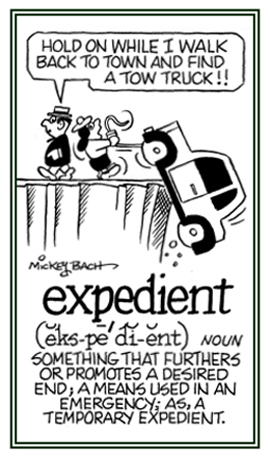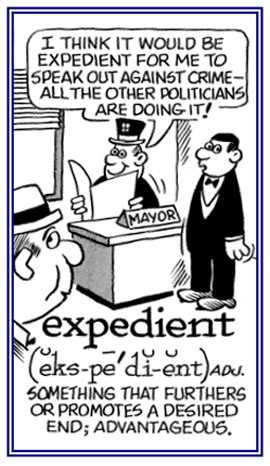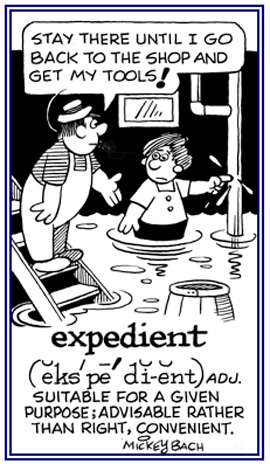ped-, pedi-, -pedal, -ped, -pede, -pedia
(Latin: foot, feet; people often see this ped element in other words. When people refer to "pedal extremities", they mean "feet". When anyone pushes the pedals of a bicycle, it is done with the feet. A pedestrian must use the feet for walking. A quadruped has four feet while a centipede has "100 feet"; or a large number of them because it may be impossible to count all of them.)
2. The feature or characteristic of being compatible or acceptable to bring about a desired result or an intended objective: It proved to be an expediency to have the equipment in the fitness room already set up before the students entered for their exercises.
3. Adherence to self-serving means: Sharon was an ambitious politician who was guided by expediency rather than principle.

Go to this Word A Day Revisited Index
so you can see more of Mickey Bach's cartoons.
2. A means to an end: Mack used a hidden key as a useful expedient to get into his house because he forgot to take his regular set of keys with him when he went shopping.
3. An objective that is devised or employed as a procedure to achieve a desire; not necessarily an honest one: The governing body was accused of choosing short-term expedients instead of practical economic policies.
The criminal resorted to shady expedients in order to rob banks.
4. Etymology: from Latin, "to free (a person’s) feet from fetters"; an antonym of "impede"; hence, "to free from difficulties, to help forward, to get (a work) completed, to dispatch, to send off", etc.
Go to this Word A Day Revisited Index
so you can see more of Mickey Bach's cartoons.
Frank told his son to be calm, do the right thing, and not to hurry too quickly in order to make an expedient decision.
2. Conveying some proposed or desired objective; fit or suitable for the purpose; proper under the circumstances: Jim thinks it is an expedient idea that he and his wife go home now because the storm could get worse.

Go to this Word A Day Revisited Index
so you can see more of Mickey Bach's cartoons.
2. To deal with something, especially a business transaction, swiftly and efficiently: Jim was told by his insurance company that it would expedite the processing of his insurance claim as soon as possible.
3. Etymology: from Latin expeditus, past participle of expedire, "to make fit or ready, to prepare"; literally, "free the feet from fetters"; hence, "to liberate from difficulties"; from ex-, "out" + pedis "fetter, chain for the feet"; related to pes, pedis, "foot".
When anyone expedites anything, he or she is actually "freeing" the feet for faster action.


Go to this Word A Day Revisited Index
so you can see more of Mickey Bach's cartoons.
2. Someone who is employed to ensure efficient movement of goods or supplies in a business.
2. People who participate in organized trips with defined goals: The expedition had to sleep in tents while they were in the desert during their explorations.
3. Etymology: from the Latin verb expedire, which originally had the meaning: "free one’s feet" from a snare, for example.
An expedition is often a group of people sent on some important undertaking and so their feet must be free to move without hindrance.
2. A reference to an answer that is quickly given: Jim gave his mother an expeditious response to her question as he was leaving to catch his bus to go to school.
3. Etymology: whenever anyone is expeditious (fast) about doing anything, it is because that person's feet are not tied up. This is because the Latin word pes (a stem of ped) means "foot" and ex means "out of".
2. Acting or done with speed and efficiency.
2. Done quickly.
2. An animal having its toes divided.
2. A creature with six feet, a hexapod.
Keep in mind that all of the ped words which you see in English are not always from the Latin "foot" or "feet". There are also some Greek ped words in English which do not mean "foot"! So, don't confuse this Latin element with a Greek pedo- that means "child" or the Greek pedo- which means "ground, soil".
If you want to leave footprints in the sands of time, don’t drag your feet.


